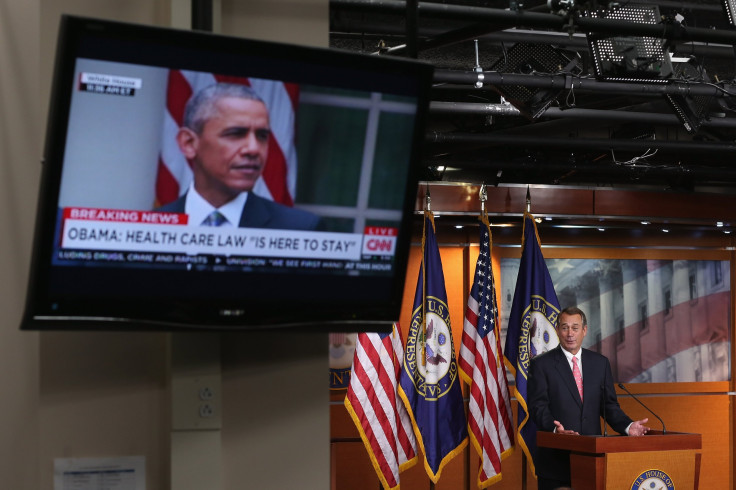Supreme Court Healthcare Ruling: Republicans Sense Defeat In Wake Of Decision

WASHINGTON -- Congressional Republicans are beginning to sense defeat. The options to undermine or eliminate the Affordable Care Act are running out, and with the Supreme Court again ruling to keep the law intact, they may be out of options. At least until President Barack Obama leaves office.
The most strident conservatives -- who pushed their leadership into forcing a 17-day government shutdown in 2013 in an attempt to undermine Obamacare -- aren’t pushing for such extreme measures this time. And even those who want to see more votes on the House floor admit that they may be able to use procedural efforts to get a bill onto Obama’s desk, but that is the closest they’ll get to victory. He will undoubtedly veto it, and Republicans lack the votes to override.
“Get a new president,” Rep. Thomas Massie, R-Ky., said when asked what Congress should do now to try to change the ACA in the wake of the Supreme Court ruling. Every Republican running for president has endorsed getting rid of the law.
If there is a silver lining for Republicans, it's that people who had their subsidies taken away will not be able to rail against Republicans during the election. "In some ways this could actually help our presidential candidate, because there won't be the folks out there without subsidies screaming out," said Rep. Matt Salmon, R-Ariz. "Most Americans who have really been hurt by this for the last couple of years will be the loudest voices now."
Had the Supreme Court ruled to strike down healthcare subsidies for states with federally-administered insurance exchanges, it could have been both a blessing and a curse for Republicans who are running Congress. They would have been forced to figure out a response -- which could have disintegrated into partisan infighting. But it also could have provided them with a significant amount of leverage to force President Obama to accept substantial changes to the law -- like delaying individual and employer mandates until after the 2016 election.
But instead, the court ruled 6-3 in King v. Burwell to keep the subsidies in places, handing a major victory to the White House. And leaving Republicans with few options moving forward.
House Speaker John Boehner said there was a plan ready to go had the court sided with them. Most of the discussions in the runup to the ruling were about what to do if they won the case. Boehner said there was little discussion about what to do if they lost.
Asked how or when or even if House Republicans would try again to repeal the healthcare law during the current session of Congress, Boehner said he didn’t know. “We haven’t made any decisions,” Boehner told reporters at a press conference Thursday after the court’s decision was released. Nor would he commit to the House holding a vote this year on a replacement.
The biggest push from conservatives in Congress is to use the process of budget reconciliation to repeal the healthcare law. The rules that govern the budget process allow for a way to skip the filibuster and pass bills with only a simple majority -- only if the law change doesn’t increase the deficit after 10 years. But that can still be vetoed.
“Now is the time to use reconciliation as leadership promised, again the court is not going to bail us out. What’s our option? What’s our alternative? What’s our solution?” Rep. Tim Huelskamp, R-Kan., said. But he doesn’t want a repeat of the 2013 fight, despite being one of the most vocal supporters at the time. “No, we use reconciliation. That’s what leadership promised us; they promised it for years,” he said when asked about using must-pass legislation.
Boehner wouldn’t commit to using reconciliation. “There has been no decision about how to deal or what to use reconciliation for,” he said.
Boehner also wouldn’t rule out entirely that Republicans could try to attach changes to Obamacare to a “must-pass” piece of legislation, like a spending bill. That’s the formula that led to the government shutdown in 2013. “As we know, it’s very difficult to deal with it when you have a president who fundamentally disagrees with us, so the struggle will continue,” Boehner said.
© Copyright IBTimes 2024. All rights reserved.






















